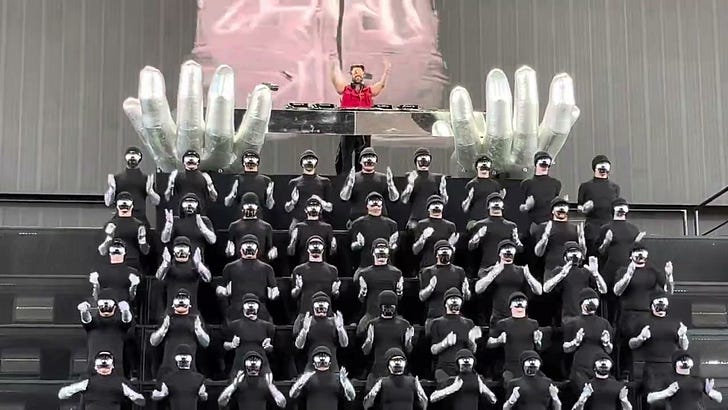Can a Brazilian DJ Keep Art Human in the AI era?
Art imitates AI as a protest against AI taking over art
An enormous avatar of a DJ pulsed to an EDM set at Coachella. Dancers below wore masks and metallic gloves and accompanied the music with angular movements that looked suspiciously like DALL-E style animation.
Between them stood Alok, the Brazilian DJ and the real-life version of the avatar. Italian dance troupe Urban Theory choreographed a routine that intentionally recreated the telltale signs of machine-driven art.
It was art imitating AI as a protest against AI taking over art.
Alok Achkar Peres Petrillo, 33, is the best-known face of the “Keep Art Human” movement that wants to prevent artificial intelligence from taking over music, theater and visual art, reports the LA Times.
Alok is not overtly opposed to AI and acknowledges using it himself, but wants to make sure the machines don’t displace the people.
"To make art, you need a soul. Don't treat technology as an enemy, but as an ally. It's a time of resistance, of taking a stand. We, artists, have to maintain culture,” Alok told CNN Brasil.
Spinning the machines
DJs are unusual advocates in this space. Their work by definition revolves around the music of others.
Skeptics dismiss them as overhyped button-pushers who shouldn’t be considered musicians. But if you’ve ever danced to a good DJ, you can distinguish them from the hacks.
I have listened to some AI-crafted EDM on Suno and still prefer the real thing.
At the same time, AI generates playlists that help me find new music. The recommendation features of most streaming services use LLMs to figure out what you might like based on what you already listen to.
And if Brazil could create a successful AI talk-show host influencer, couldn’t an LLM simply take Alok’s idea of the avatar DJ and send it out on a club circuit? AI imitating art imitating AI?
LatAm Headlines
Virgílio Almeida, a professor of computer science at the Federal University of Minas Gerais and a researcher at Harvard, argues for a cautious and controlled regulation of AI to prevent it from widening the gaps between Brazil and other countries, in an interview with Estadão.
Mexico’s Cinematography Association calls for legislation to protect audiovisual production jobs, after a bank announced it was creating a commercial using only AI, reports El Universal.
Brazil’s ENEM high school exam will soon be graded by artificial intelligence. Now AI is part of the subject material, including this reading comprehension test question, reports Folha. Give it a shot.
Training AI models requires processing a large amount of data. This task is often performed by outsourced workers in developing countries who receive low wages and face precarious conditions. The text criticizes technological change because of the following consequence:
Promotion of large-scale professional training.
Strengthening of diplomatic relations between countries.
Invisibility of the labor involved in the process.
Enhancement of human cognitive abilities.
Macro Prompt
Nvidia sells ‘Sovereign AI’ vision to Europe - It turns out that Brazil and Chile aren’t the only countries interested in homegrown LLMs. Nvidia is pitching European countries on “Sovereign AI” models in which nations control their own LLMs, data, and compute, reports Reuters.
The Global A.I. Divide - AI has created a new digital divide, fracturing the world between nations with the computing power for building cutting-edge A.I. systems and those without, reports the New York Times, which compares a vast AI data center being developed in Texas to a small and cramped back room in Argentina that qualifies as the same.
UK universities confront AI-era cheating surge - A new survey finds that over 40% of UK university staff have caught students using generative AI tools like ChatGPT to cheat—yet just 7% felt equipped to address the issue, reports The Guardian.




